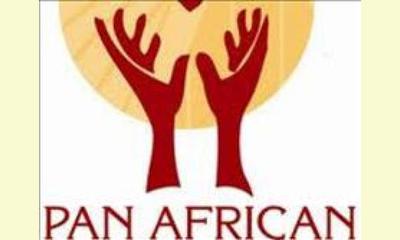|
|
Participants in the Pan-African Forum Recommend the Valorization of African Culture
an article by CPNN on the basis of two articles by the National Radio of Angola: 70892 and 71013
Participants at the Pan African Forum:
Fundamentals and Resources for a Culture of Peace
recommended Thursday, 28/03, in Luanda, the
valorization of African culture in dialogue and
reconciliation as found in the National Republic
of Angola (See also CPNN on March 26.

click on photo to enlarge
According to the final communiqué of the event,
which lasted for three days and whose final
ceremony was chaired by the Angolan minister of
Education, Mpinda Simon, African culture should be
promoted through the educational use of the
General History of Africa, highlighting the great
personalities who have contributed to peace
building and promotion of permanent interactive
community dialogue and reconciliation, involving
civil society and the media.
The Forum also recommended the strengthening of
relations between education and culture to build
pathways to effective education and training, to
promote peaceful coexistence in Africa, by
conducting studies on the mechanisms of conflict
resolution in traditional societies in different
regions of the continent. The revision of the
curriculum of general and university education to
emphasize the culture, languages, and history of
Africa was also highlighted.
Participants concluded that the implementation of
the proposals for a culture of peace rests on the
consideration in national education policy.
However, the document adds, the analyzes show that
the educational systems in the African region
still depend largely on outside help, which favors
the degradation of local customs and values.
Based on the accumulated experience in various
countries in Africa in terms of rites and
traditions, the endogenous initiation of
women/girls and men/boys can help rebuild a
culture of peace, starting at home and going
through the different levels of formal education
and non-formal.
The Forum also recommended the development of the
cultural economy, creating jobs for the youth, the
vision of sustainable development of the continent
by promoting mechanisms that promote youth
entrepreneurship in the new technology sectors and
the cultural industry.
With regard to natural resources, it was
recommended to continue the promotion of
scientific cooperation and diplomacy for sharing
of resources, involving increasingly, educational
institutions and scientific research, policy
makers and local, regional and international
funders. Also in this area, it was proposed to
develop green and blue economies, create jobs for
all, especially for young people, incorporating
the curricula of general and higher education
syllabus related technologies in this field, and
promoting their funding.
Anthropologist Ana Maria Oliveira, delegate to the
Pan-African Forum, considers that "Cultural values
are an indispensable foundation for the
consolidation of the personality of a country, I
think it is all relevant and important to this
discussion."
And university professor, Laurinda Uigard, said that
"this forum will bring to our country, the rightful
role as a leader on the African continent to
consolidate a peace process, after many decades of
violence" .
For official conclusions of the forum see the UNESCO report.
(Click here for a Portuguese version of this article)
|








|
DISCUSSION
Question(s) related to this article:
The understanding of indigenous peoples, Can it help us cultivate a culture of peace?
* * * * *
Latest reader comment:
Two articles in recent years in CPNN point to the renewed recognition of the importance of indigenous knowledge and traditions to help save us from the ecological disaster of the global industrialized economy.
In the article preparing for the upcoming People's Summit in Rio (See CPNN April 12, 2012), Fabiola Ortiz emphasizes the importance of involving indigenous peoples in the decision-making about development projects.
The indigenous peoples of the Amazon made this argument very dramatically and eloquently in person at the World Social Forum in Belem, Brazil, as described the CPNN article of February 6, 2009.

|
|









